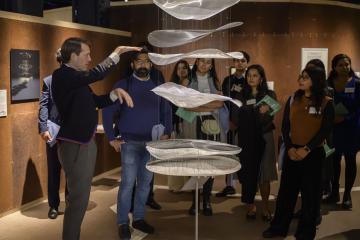Global Challenges, Regional Perspectives
Over 100 people gathered over two days for a MacMillan Regional Futures Lab program in London that examined how regional perspectives can shape a more sustainable and equitable future. Led by the South Asian Studies Council and the Council on African Studies, the two events were designed to elevate the work of these councils, connect with alumni, and foster partnerships.
Water Water Everywhere: insights from South Asia into climate pressures on the Global South, hosted on October 15 by the South Asian Studies Council in collaboration with The Wellcome Collection, centered on how water shapes societies and drives innovation. Sunil Amrith, Director of the MacMillan Center, joined Anthony Acciavatti, the Diana Balmori Associate Professor of Architecture, for a discussion on how scarcity and abundance inform the ways communities adapt to environmental change. Their dialogue, grounded in Amrith’s award-winning book The Burning Earth and Acciavatti’s visual research Groundwater Earth, invited audiences to consider how history, design, and imagination intersect in the struggle for planetary balance. Guests enjoyed a private curator-led tour of the Thirst exhibit, which features an installation of the Acciavatti’s work.
On October 16, the Council on African Studies partnered with the 1-54 Contemporary African Art Fair to host , Ecological Resilience: on balancing people, place, and planet in Africa. Following an introduction by Cajetan Iheka, Chair of the Council on African Studies, Mae-ling Lokko, Assistant Professor of Architecture at Yale and founder of Willow Technologies, shared how her work transforms agricultural waste into sustainable building materials, empowering and employing local communities while promoting environmental renewal across West Africa. Joshua Amponsah, a Yale Fox International Fellow and graduate of the African Studies master’s program, then discussed his research on community-led conservation in Ghana and Kenya. The conversation explored how art, architecture, and literature can inspire more just and sustainable environmental futures. Registered guests were later treated to private tours of the 2025 1-54 London show and a reception at the onsite restaurant, Setlist.
By centering multidisciplinary regional expertise, the events underscored a vital truth: viewing global challenges through the lens of the shared context and history of a region is likely to yield nimble, effective solutions. This reflects the purpose of the Regional Futures Lab, which connects scholars, practitioners, and communities across the world to reimagine how regional collaboration can drive global change.
Looking Ahead
The Lab seeks to build on this momentum by developing a model for continued knowledge and research exchange, strengthening networks for capacity-building, and creating new opportunities for cross-regional partnership. Together, these efforts highlight the distinctive value of the MacMillan Center and its seven regional councils as catalysts for interdisciplinary innovation and global understanding.
The Yale MacMillan Center is more than just an academic hub,” said Amponsah, “it is a true home for students from all seven continents and a source of inspiration for those who dare to dream.
In this spirit, an international cohort of students is currently developing an information hub for the Regional Futures program, which will include explainers, case studies, and features on the work of Yale faculty.
To extend the impact of these discussions, the MacMillan Center has made the recording of the Ecological Resilience conversation available as part of its growing archive of Global Program materials. The audio, featuring Iheka, Lokko, and Amponsah, will serve as a resource for scholars and storytellers interested in the intersections of art, sustainability, and regional research. Planning is also under way for future events on campus and in the world.
View event presentations:


